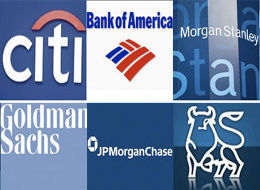
Every morning when I wake up, I check news headlines of the day while getting the children ready for school. Today's headlines around the world such as the Washington Post shouted "U.S. Forces Nine Major Banks To Accept Partial Nationalization". This really should have really come as no surprise to anyone considering that the US government and Federal Reserve gave themselves unprecedented power over our financial systems and the banking and financing industry during the recent economic crisis when Congress enacted the bailout--I mean financial rescue--legislation.

It just strikes me as somewhat ludicrous that in the last few weeks, the hypocritical Republican party faithful have time and time again decried Senator Barack Obama for being a "radical", "palling around with terrorists", "Muslim", "Arab" and a "socialist" especially at McCain-Palin rallies. Well here's your hero socializing the banking industry--that's what "nationalization" means. Spin it any way you want, but don't say that Obama is a "socialist" when your favorite President after Reagan has consistently made larger government a priority. This is just the latest in a trend of power grabs that Dick Cheney and George W. Bush have made under their administration's 8-year plan to consolidate as much power in the offices of the Presidency and Vice Presidency, even superseding the powers granted the Executive Office of government by the Constitution.

I'm not saying that bank nationalization is bad, I'm just saying, be consistent with your rhetoric. If you're going to take Obama to task for something he hasn't done yet, and does not have the power to do, make sure to call out your own who have already perfected such a thing to an art form.
More from the Washington Post:
The Treasury Department's decision to take equity stakes in banks represents a significant reversal, coming just weeks after Treasury Secretary Henry M. Paulson Jr. had opposed the idea. In a momentous meeting yesterday afternoon in Washington, Paulson, flanked by top financial regulators, told the executives of nine leading banks that they needed to participate in the program for the good of the national economy, two industry sources said on condition of anonymity because they were not authorized to speak publicly.
The government's initiative, which was to be announced this morning before the markets open for New York trading, is part of a wider plan that goes beyond the $700 billion rescue package approved by Congress earlier this month. The Federal Deposit Insurance Corp. is also set to announce today the launch of an insurance fund to guarantee new issues of bank debt. It will provide unlimited deposit insurance for non-interest-bearing accounts, which are widely used by small businesses for payroll and other purposes.
In pressing the bank executives to accept partial government ownership, Paulson's message was clear: Though officially the program was voluntary, the banks had little choice in the matter. In exchange for giving the Treasury minority stakes, the nine firms would jointly receive an investment worth $125 billion. The government would make another $125 billion available for the next 30 days to thousands of other banks and thrifts across the country.
Federal officials set conditions, telling the banks they could not raise their dividends without government permission and could not offer their executives new retirement packages, though the old packages would remain intact.












No comments:
Post a Comment